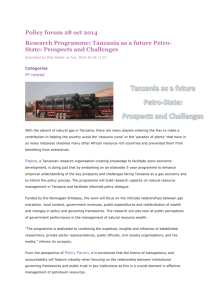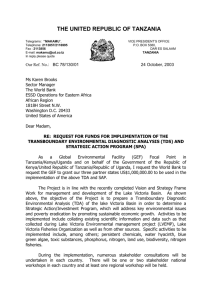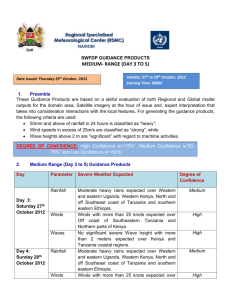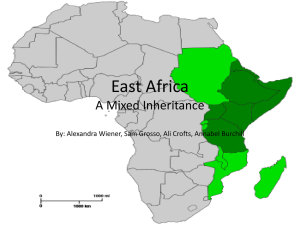The Role and Place of Media, Civil Society and Academia in
advertisement
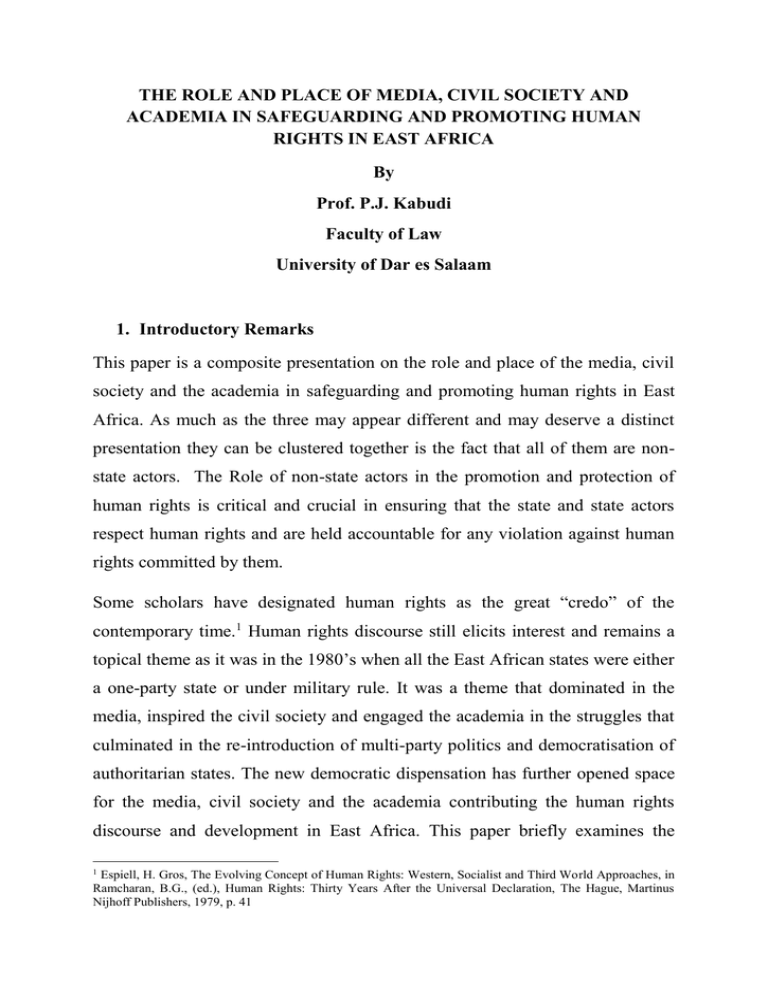
THE ROLE AND PLACE OF MEDIA, CIVIL SOCIETY AND ACADEMIA IN SAFEGUARDING AND PROMOTING HUMAN RIGHTS IN EAST AFRICA By Prof. P.J. Kabudi Faculty of Law University of Dar es Salaam 1. Introductory Remarks This paper is a composite presentation on the role and place of the media, civil society and the academia in safeguarding and promoting human rights in East Africa. As much as the three may appear different and may deserve a distinct presentation they can be clustered together is the fact that all of them are nonstate actors. The Role of non-state actors in the promotion and protection of human rights is critical and crucial in ensuring that the state and state actors respect human rights and are held accountable for any violation against human rights committed by them. Some scholars have designated human rights as the great “credo” of the contemporary time.1 Human rights discourse still elicits interest and remains a topical theme as it was in the 1980’s when all the East African states were either a one-party state or under military rule. It was a theme that dominated in the media, inspired the civil society and engaged the academia in the struggles that culminated in the re-introduction of multi-party politics and democratisation of authoritarian states. The new democratic dispensation has further opened space for the media, civil society and the academia contributing the human rights discourse and development in East Africa. This paper briefly examines the 1 Espiell, H. Gros, The Evolving Concept of Human Rights: Western, Socialist and Third World Approaches, in Ramcharan, B.G., (ed.), Human Rights: Thirty Years After the Universal Declaration, The Hague, Martinus Nijhoff Publishers, 1979, p. 41 articulation of human rights in the East African Constitutions before discussing the role and place of the media, civil society and the academia in safeguarding and promoting human rights in East African countries of Kenya, Uganda and Tanzania. It is a fact that Kenya, Uganda and Tanzania are not only geographical neighbours, but also share a lot of historical, political, social and cultural experiences and similarities. They have the same legal system based on AngloSaxon common law tradition. And, up to 1977 they shared the same highest court, which was the Court of Appeal for Eastern Africa. The abrupt demise of the Court of Appeal for Eastern Africa was prompted by the collapse of the East African Community which grouped together the three countries in a common market. However, despite the demised of the East African Court of Appeal its decisions are still binding authority in the respective countries through the doctrine of precedent. 2 Also up to 1970, they shared the same University of East Africa with university colleges at Makerere in Uganda, Nairobi in Kenya and Dar es Salaam in Tanzania. During that time the Faculty of Law, University College Dar es Salaam trained lawyers from the three East Africa countries. 3 The new East African Community has been established by the Treaty for the Establishment of the East African Community comprising originally of Kenya, Uganda and Tanzania was signed in 30th November 1999. Although the Treaty has not re- established the Court of Appeal of Eastern Africa it has created the East African Court of Justice which has jurisdiction over the interpretation and application of the Treaty.4 However unlike the former EAC the Treaty establishing the New EAC makes adherence to universally acceptable principles 2 See Mapunda, A.M., Mukoyogo, M.C., and Nguluma, A.T., Reflections on Stare Decisis in the Court of Appeal of Tanzania, Eastern Law Review, Special Issue on the Tenth Anniversary of the Court of Appeal of Tanzania, Vol. 16, Dec. 1989, No. 2, pp. 1-23 33 Kapinga, W.B.L., The Legal Profession and Social Action in the Third World: Reflections on Tanzania and Kenya, 4 RADIC (1992), p.877 4 Article 27 of the Treaty for the Establishment of the East African Community. of good governance, democracy, the rule of law, observance of human rights and social justice to be a condition for a state to be a member of the Community.5 2. Constitutionalism and Human Rights East Africa has not escaped the wave of change towards pluralistic forms of politics and constitutional order. The East African constitutional terrain has witnessed ebbing negative and positive developments in the protection and promotion of human rights. With the adoption of multi-party system, the East African countries have once again affirmed their recognition of liberal democratic principles. This includes one of the fundamental principles of liberal constitutionalism, the recognition and guarantee of the fundamental freedoms and rights of the individual.6 Constitutional rights, as correctly pointed out by Goerlich “are not an isolated part of the constitution” but more to it “they are incorporated in it, hence, these rights are dependent on the perception of the general principles”.7 In a treatise on constitutions of the former British colonies, de Smith, elaborating on constitutionalism, commented as follows: “A contemporary liberal democrat, if asked to lay down a set of minimum standards, may be very willing to concede that constitutionalism is practised in a country where the government is accountable to an entity or organ distinct from itself, where elections are held on a wide franchise at frequent intervals, where political groups are free to organise in opposition to the government in office and where there are effective legal guarantees of fundamental civil rights enforced by an independent judiciary; and he may 55 Article 3 of the Treaty for the Establishment of the East African Community. Kabudi, P.J., Human Rights Jurisprudence in East Africa: A Comparative Study of Fundamental Rights and Freedoms of the Individual in Tanzania, Kenya and Uganda, Baden-Baden, Nomos Verlag, 1995, p. 9 7 Goerlich, H., Fundamental Constitutional Rights: Content, Meaning and General Doctrines, in: Karpen. U., (ed.), The Constitution of the Federal Republic of Germany: Essays on the Basic Rights and Principles of the Basic Law, Baden-Basden, Nomos Verlag, 1988, p. 62 6 not easily be persuaded to identify constitutionalism in a country where any of these conditions is lacking.”8 The same position is advocated by a Nigerian constitutional lawyer, Nwabueze, who emphasized that: “There can be no doubt that the core and substantive element of constitutionalism is the limitation of government by a constitutional guarantee of individual civil liberties enforceable by an independent tribunal. Deriving from the fundamental values of society, values which, articulated in public opinion, express a society’s way of life and uphold its members’ personality, individual civil liberties are indeed the very essence of constitutional government.”9 The linkage of constitutionalism to human rights is one of the major feats in the development of modern democratic constitutions resting on two fundamental pillars that is limited government and guaranteed of individual rights and freedoms. Another African scholar, Mahmoud Ben Romdhane from Morocco points out that liberal constitutionalism or liberal democracy rests on four pillars. These are: (1) individual freedoms; (2) public freedoms (among which are the right to organise, associate and demonstrate as fundamental rights); (3) people’s sovereignty through direct universal vote: and (4) separation of powers (hence limitation of the executive). A limited government is one which is based on principles of democracy. All these constitutional principles and doctrines that are ipso facto relevant for guaranteeing human rights are ingrained in all the four constitutions of the three 8 9 de Smith, S.A., The New Commonwealth and Its Constitutions, London, Stevens & Sons, 1964, p. 106 Nwabueze, B., Constitutionalism in Emergent States, London, C. Hurst & Co. 1973, p. 3 East African states of Kenya, Uganda and Tanzania. They incorporate a Bill of Rights as well as the doctrine of separation of powers and the principle of rule of law, with all their attendant attributes, i.e, checks and balances. Human rights borrowing from section 70 of the Constitution of Kenya which is a preambular clause to the Bill of Rights clusters freedoms and rights of the individual three groups: (a) life, liberty, security of the person and the protection of the law; (b) freedom of conscience, of expression and of assembly and association; and (c) protection for the privacy of his home and other property and from deprivation of property without compensation. However, human rights as currently conceptualised include also social, cultural and economic rights. These rights are provided for in the Constitutions in Tanzania and Uganda as part of the fundamental objectives and directive principles of state policy. In the case of Tanzania the Constitution is categorical that fundamental objectives and principles of state policy are not enforceable in a court of law.10 Although fundamental objectives and directive principles of state policy are not justiciable, this part of the Constitution has played a significant role in the development of human rights jurisprudence in Tanzania.11 Socio-cultural and economic rights are being included in the Bill of Rights as it is the case with civil and political rights. The draft Constitution of Kenya also 10 Article 7(2) of the Constitution of the United Republic of Tanzania Kabudi, P.J., The Directive Principles of State Policy in Tanzania, in: Binchy, W., and Finnegan, C. (Eds), Human Rights, Constitutionalism and the Judiciary: Tanzanian and Irish Perspectives, Dublin, Clarus Press, 2006, p. 37. 11 contains proposals for social, cultural and economic rights on their own right and not as part of fundamental objectives and principles of state policy. 12 The following part proceeds to discuss the role and place of the media in safeguarding and promoting human rights. 3. The Role and Place of the Media The basic tasks of the media in a democracy have been classified under three main headings13: (1) The task of observing and informing primarily as a service to the public (2) The task of participating in public life as an independent actor by way of critical comment, advice, advocacy and expression of opinion (3) The task of providing a channel, forum or platform for extra media voices or sources to reach a self-chosen public. The specific occupational tasks of the media are many. However they can be classified basic activities. These are discovery, collection, and selection of information; processing into news accounts; providing background and 12 Proposed Article 43 of the Proposed Constitution of Kenya published on 6 th May 2010 by the Attorney General of Kenya provides that: “ (1) Every person has the right(a) To the highest attainable standard of health, which includes the right to health care services, including reproductive health care; (b) To accessible and adequate housing, and to reasonable standards of sanitation; (c) To be free from hunger, and to have adequate food of acceptable quality; (d) To clean and safe water in adequate quantities; (e) To social security; and (f) To education. (2) A person shall not be denied emergency medical treatment. (3) The State shall provide appropriate social security to persons who are unable to support themselves and their dependants. 13 Christians, C.G., et. al, Normative Theories of the Media: Journalism in Democratic Societies, Urbana and Chicago, University of Illinois Press, 2009, p. 116. commentary; and publication.14 Therefore for the media is required to advance democratic system and protect and promote human rights by15: (1) Providing surveillance (2) Forming opinion (3) Setting the agenda of public discussion (4) Acting as a watchdog (5) Acting as messenger and public informant (6) Playing an active participant part in social life It is imperative for the discussion on the role and place of media in promoting and protecting human rights to be based on the constitutional provisions on the Right to Freedom of Expression. It forms one of most important factors in the development of political will and sustenance of democracy.16 This includes also the promotion of independent judgment of government action and the enhancement of public order. All the constitutions in East Africa have provisions providing for the freedom of expression. Freedom of expression is composed of four different components. These are freedom of opinion, freedom to receive ideas and information, freedom to communicate ideas and information and freedom from interference with individual’s correspondence. All together they provide for and guarantee the right to communication of ideas. Freedom of the media or press is not expressly mentioned in the Constitutions of East Africa. Lack of such an express mention is redressed by the fact that realisation of the freedom to gather and disseminate information as guaranteed in these constitutions of necessity includes freedom of the media or press. 14 Christian. C.G., et. al, op. cit., p. 119 Ibid. 16 Sieghart, P. International Law of Human Rights, Oxford, Clarendon Press, 1983, pp. 330 – 331; Karpen, U., Freedom of Expression, in: Karpen, U. (ed) The Constitution of the Federal Republic of Germany: Essays on the Basic Law, Baden-Baden, Nomos Verlag, 1983, p.92. 15 Therefore, freedom of the media or the press is derived from the right to freedom of expression and it has developed to the extent of some scholars presenting it as a separate right. The ownership of Media in East Africa is mainly divided in two groups. That is Government owned and private owned media. Public owned media that are not controlled by the Government but funded by public finances through Parliamentary budget allocations are yet to be established in East Africa. In all East African states radio stations until the late 1990’s was government owned and controlled. The same applied to television stations with exception of Mainland Tanzania which started with private owned television stations before the state established one recently. However since the 1990’s private ownership radio stations has been phenomenal especially with establishment of FM radio stations in different towns and areas of Tanzania. 17 The same applies to Kenya and Uganda where mushrooming of private radio stations has resulted in the founding of FM stations that have been so powerful and influential in Kenya and Uganda especially trough there call in programmes where listeners participate live in radio programmes. This has led to friction of such radio stations with the state where such live programmes have been used to criticise the Government in Uganda. In the case of Kenya it is claimed that some FM radio stations especially those broadcasting in vernacular languages were used to ferment violence after the last disputed General Elections in Kenya. 18 17 Matumaini, J., The History of Radio Broadcasting for Development in Tanzania, Mwanza, St Augustine University of Tanzania Press, 2009, p. 91 explains that since 1994 private radio stations have mushroomed in Tanzania and there are currently more than 45 registered stations such as Radio One, Radio Sibuka, Radio Faraja, Radio Times, Radio SAUT, Radio Sauti ya Injili, Living Water FM, Radio Uhuru, Radio Free Africa, Passion FM, Clouds FM, Mlimani Radio, Radio Wapo, Radio Upendo, Radio Maria, Praise Power Radio, Magic FM, Kiss FM, Radio Sauti ya Quran, Radio Aboud and Radio Tumaini. 18 Perhaps that experience is the reason for the Proposed Constitution of Kenya under Article 33(2) providing that: “The right to freedom of expression does not extend to(a) Propaganda of war; (b) Incitement to violence; (c) Hate speech; or (d) Advocacy of hatred that – The ownership of newspapers is the same like that of radio and television where private owned newspapers out number government owned newspapers. There are now more diverse newspapers in circulation catering for different interests and tastes of the readers. They vary in the aspects they cover ranging from social, economic and political issues to sports, leisure and gossips. This means newspapers are not homogeneous but heterogeneous just the society is. Despite that diversity in ownership of the media still it plays a great role in the building of a democratic society and therefore in the protection and promotion of human rights. However, that does not apply automatically. The media has also been used to suppress human rights either by concealing or by deliberately distorting the truth depending on those who own or control them. Section of the media has played an important role as a forum in the struggles for democratic governance and human rights in East Africa. At the same time there was a section of the media which supported and justified the authoritarian rule in some of the East African states. Therefore for the media to be able to play a positive role in safeguarding and promoting human rights it must believe in democratic systems of governance and in human rights. It must be imbued in human rights culture and practice in its editorial policy and coverage. It must abhor violation of human rights and work to expose such violations in its midst. It must fight against discrimination in the media. The media has also been a victim of violations of human rights by the state. Governments of East Africa in varying degrees and instances have taken action that has curbed the freedom of the media. This has recently been witnessed by states enacting Media Acts that instead of promoting freedom of the media it (i) (ii) Constitutes ethnic incitement, vilification of others or incitement to cause harm; Is based on the ground of discrimination specified or contemplated in Article 27 (4). has curtailed it.19 The media has great role in the protection and promotion of human rights by exposing violations of human rights committed by the state and individuals. The major affront to human rights as much as it emanates from state action and that needs a bold media to expose such actions. The media can play a role of creating awareness and empowering the people in relation to human rights. In this aspect the media needs to co-operate with the civil society in making the people aware of the rights guaranteed and empowering them by allowing participation of the people in promoting and protecting human rights. It is only when they are aware and empowered that the people can vindicate their rights and freedoms. 4. The Role and Place of the Civil Society The civil society can be narrowly or broadly defined. The narrow definition of civil society tends to favour an instrumentalist definition viewing them as independent groups and associations pushing for particularistic interests which form the totality of the concerns of the society.20 The broader definition approaches the civil society from a programmatic viewpoint. It describes the civil society as an arena where manifold social movements and civic organisations from all classes attempt to constitute themselves into an ensemble 19 For example in Uganda the Press and Journalist (Amendment) Bill, 2010 has generated a lot of criticism from media and human rights activist in Uganda that it is aimed at curbing the freedom of the media. In Tanzania the process of preparing the Media Bill and the Access to Information Bill has stalled. The proposed Constitution of Kenya has provisions on freedom of the media and access to information and it requires under proposed Article 34 (2) that “All State-owned media shall(a) be free to determine independently the editorial content of their broadcasts or other communications; (b) be impartial; and (c) afford fair opportunity for the presentation of divergent views and dissenting opinion.” 20 Walubiri, P.M., Liberating African Civil Society: Towards a New Context of Citizen Participation and Progressive Constitutionalism, in: Oloka-Onyango, J. (ed.), Constitutionalism in Africa: Creating Opportunities, Facing Challenges, Kampala, Fountain Publishers, 2001, pp. 86-87. of arrangements so that they can express themselves and advance their interests.21 Despite the fact that the phenomenon of civil rights of the modern society is a recent development in Africa the civil society in East Africa has played significant and pivotal role in reversing social decay, rolling back the dictatorial state, and advancing individual liberties.22 The role played by the civil society in the protection and promotion of human rights in East Africa needs no emphasis. The civil society has actively pursued issues of violations of human rights and struggles for the widening the democratic space in East Africa. This has not been an easy struggle as it has resulted in big sacrifices by some of the human rights activists being arraigned by the state and jailed. There are times the existence of civil society was threatened by the state through enactment of pieces of legislation that aim at controlling and curbing them. The organisation of civil society is based on the constitutional right to the freedom of association while their operations are founded on the constitutional right of the freedom to participate in public affairs.23 In all the three East African states laws have been enacted for registration and regulation of NonGovernment Organisations (NGOs). The laws have been criticised on the ground that they have introduces stringent conditions for the registration and operation of the NGOs. The role of the civil society in the protection and promotion of human rights is manifold. Through the media and other forums the civil society contributes to 21 ibid Mutua, M., Human Rights NGOs in East Africa: Defining Challenges, in Mutua, M, (ed), Human Rights NGOs in East Africa: Political and Normative Tensions, Philadelphia, University of Pennsylvania Press, 2009, p. 13 23 Article 21 (2) of the Constitution of the United Republic of Tanzania provides that: “Every citizen has the right and the freedom to participate fully in the process leading to the decision on matters affecting him, his well-being or the nation.” 22 the awareness creation and sensitizing the people on their rights and how to defend them. In their organisational role the civil society through lobbying and advocacy can push and influence the legislature to enact laws that protect and promote human rights and monitor state action to ensure that it respects human rights. Another formidable avenue available to the civil society to further the promotion and protection of human rights is acting through the court system. This may be through taking up public interest litigation. The courts in East Africa even during the one-party state delivered seminal judgments that ensured that human rights violations are not tolerated with impunity. That was not smooth operation as the judiciary in some countries was subjected to harassment threatening the independence of the judiciary. Since the reintroduction of the multi-party state and widening of the democratic space the civil society in all the three East African states have taken cases to court that have not only resulted in redressing human rights violations but have advanced human rights jurisprudence in East Africa. 5. The Role and Place of the Academia The core functions of the academia are teaching, research and public service. There has been increase of establishment of both public and private universities in the East African countries. The academia and that mainly the institutions of higher learning in East Africa have an important role to play in the promotion of human rights. The constitutional basis of the academia having a place and playing a role in the promotion and protection of human rights is the academic freedom. Academics enjoy academic freedom to explore, develop and articulate the truth without interference from the state or any other entity. Academic freedom and freedom of scientific research is a derivative of the freedom of thought and expression. In teaching aspect it needs to be pointed out that in almost all the Universities in East Africa offer Human Rights Law as a distinct course. It forms an area of specialised post-graduate training especially at the level of Master of Laws (LL.M.). In offering courses in Human Rights the academia contributes in preparing a critical mass of experts who are conversant with human rights issues. The role of academics in society has changed and gone beyond lecturing to students. They have emerged what are known as public intellectuals who participate in different public forums with the aim of enlightening the public on different issues. Public intellectual use the media and other forums in pursuit of knowledge dissemination and public opinion making. Another area that the academia participates is research on different legal issues including Human Rights studies and publishing the findings focus.24. A lot of research has been conducted on human rights in East Africa. Most of the studies on human rights in Africa in general and East Africa in particular have four trends in their focus. The first trend are expository studies that have leaned more on the exposure of human rights violations, some giving the events in chronological order and publication of a detailed list of victims. That system is appreciated by human rights activists as it helps to open the eyes of the world about human rights violations and mobilise action to redress or stop such violations. It also galvanises the people into action and being vigilant in promoting and protecting their rights. The second trend of studies on human rights is that dealing with conceptualisation of human rights in Africa in general and East Africa in particular.25 The conceptualisation of human rights debate in Africa was for a long time preoccupied with issues of universalism and cultural 24 Kabudi, P.J., Human Rights Jurisprudence in East Africa: A Comparative Study of Fundamental Rights and Freedoms of the Individual in Tanzania, Kenya and Uganda, op. cit., p. 7 25 Shivji, I.G., The Concept of Human Rights in Africa, Dakar, CODESRIA Book Series, 1989, pp. 10 -23 relativism in human rights as a relic of Eurocentrism. 26 This argument was favoured by some African politicians who were bent to justify their actions that violated human rights arguing that human rights as articulated in international legal instruments and Bill of Rights are based on Western Europe cultural setting and values which is individualistic and capitalist as opposed to the African collective and communalistic approach to rights and duties. The third trend is that of comparative studies on human rights which were ushered by the adoption of the African Charter of Human and Peoples’ Rights.27 These studies have tackled the issue of human rights mainly from the international law point of view. The fourth trend of studies is that which focus on the internal perspective and development of human rights in East Africa in general and in each country in particular. Such studies analyse the constitutions of the respective states and judicial decisions on the Bill of Rights in order to discern the development articulation of human rights jurisprudence in East Africa.28 The Academia in fulfilling its public service function it has a role to play in the protection and promotion of human rights. They can participate in awareness raising and empowerment of the people. They can also participate in Legal Aid Schemes and Legal Aid Clinics where complaints of violation of human rights may be taken to court. Some universities in East Africa such as the Faculty of Law, University of Dar es Salaam have for many years provided legal aid services to indigent people and have taken landmark cases to court that have influenced the development of law in Tanzania. 26 Amin, Samir, Eurocentrism, London, Zed Press, 1989, ad passim. See for example Peter, C.M., Human Rights in Africa: A Comparative Study of the African Charter on Human and People’s Rights and the New Tanzanian Bill of Rights, Westport, Greenwood Press, 1990; 28 See for example Kabudi, P.J., Human Rights Jurisprudence in East Africa: A Comparative Study of Fundamental Rights and Freedoms of the Individual in Tanzania, Kenya and Uganda, Baden-Baden, Nomos Verlag, 1995 27 6. Concluding Remarks This presentation has discussed the role and place of non-state actors in safeguarding and promoting human rights in East Africa. The media in East Africa has been in the forefront of exposing human rights violations and therefore galvanising action against them. The media as part of the democratic institutions are crucial in the inculcation of the democratic culture that respects human rights. The civil society in East Africa has played a critical role in bringing constitutional changes in East Africa and making the people aware of their human rights as well as galvanising action against violations. The growing robust and vigilant civil society in East Africa continues to play an important role in the development of human rights jurisprudence through legal aid schemes and taking up strategic cases to court. As it has been discussed in this presentation the academia and academics in their teaching, research and offering public service have propounded and articulated issues that have contributed in the deepening of understanding of concepts of constitutionalism and human rights and their application in East Africa. The constitutional and legal framework for promotion and protection of human rights in East Africa is based on a solid foundation. The ongoing constitutional reforms aimed at furthering democracy constitute a move on the right direction. Despite the ups and downs on the human rights situation in East Africa the Courts as guardians of the Constitution have played a positive role in vindicating human rights. The non-state actors have enabled many people to know their rights and have empowered them to seek redress against human rights violations in courts of law. The non-state actors have also pushed vigorously for constitutional reforms aimed at strengthening democratic institutions and protection and promotion of human rights in East Africa.


